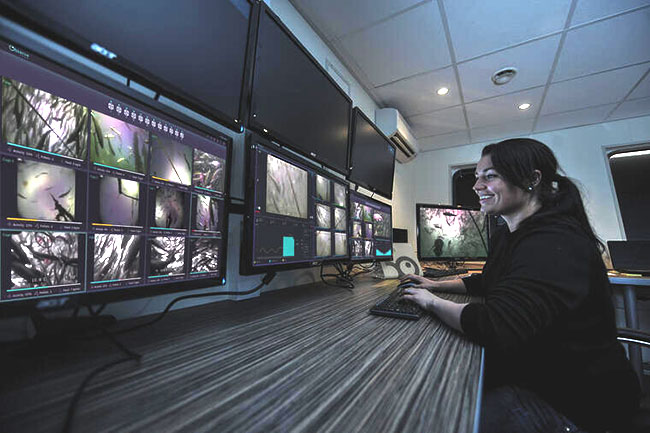
Features
Opinion
From the Editor: AI is the new buzzword
November 3, 2023 By Jean Ko Din
 AKVA group’s Observe software analyzes feeding efficiency, fish’s activity pattern and detects pellets. (Photo: AKVA Group)
AKVA group’s Observe software analyzes feeding efficiency, fish’s activity pattern and detects pellets. (Photo: AKVA Group) Artificial intelligence (AI) has captured the world’s imagination recently. And rightly so. This technology can open up new possibilities of how data is collected, processed and interpreted by a computer.
AI and machine learning technology have been around the aquaculture industry for many years. However, it seems as though it has seen a more accelerated development in the past decade. I’ve seen aquaculture commenters tout it as the “new oil.” I’d love to hear from those of you who have come from the oil and gas industry to confirm whether this comparison is accurate.
I like what ThisFish CEO, Eric Tamm, wrote about the subject. He said, “If algorithms are the engines, then data is the fuel that is bringing about the fourth Industrial Revolution, known as Industry 4.0.”
Its application in a recirculating aquaculture system (RAS) seems like a match made in heaven. A closed, land-based fish farming operation means that every single parameter can be monitored and controlled to create the most optimum environmental conditions for the stock.
With that level of control, naturally, it comes with a pressure for farmers and operators to consistently interpret data collected from every part of the facility – feeding regimens, biofiltration management, dissolved oxygen levels, water temperatures, flow rates, fish size, weight, and the list goes on.
The cover story explores some of the current applications of these deep-learning neural technologies. But, because this magazine can only hold so many pages, I don’t think we can claim this issue to be a definitive update on AI applications that currently exist in the recirculating aquaculture industry. Still, my hope is that a glimpse into some of these examples can offer some insight about its future potential.
As these RAS projects get bigger, more ambitious and more expansive, AI will play an increasingly important role in the efficiency of these operations.
At the same time, my hope is that some form of AI technology can be made accessible to all aquaculture farmers. I’m thinking of those small to medium-sized, family-run RAS farms that are producing for rural markets.
Technology can only be considered transformative, if it is made to be available to all and can benefit all. Not all new technology is like that. Sometimes, they are reserved for the capital-rich megafarms that can afford the latest and greatest.
Only time will tell how AI will continue to be embraced by the wider aquaculture industry.
As the year 2023 nears its close, I also wanted to take some time to do a progress report. I’m grateful to Matt Craze and the Spheric Research team for sharing their most recent findings for this issue. Perhaps this can help you take stock of where the industry has come and where you plan to go.
Predictions can only go so far, it might be up to you, the professionals working day-to-day, to dictate where we plan to go in 2024.
As always, I invite you to join in on the RAStech conversation. Send me your thoughts and ideas at jkodin@annexbusinessmedia.com.
Print this page